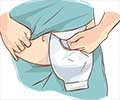Treatment:
Treatment options for uncomplicated cystitis include singledose
Single dose therapy appears to offer the advantages of low cost, high compliance and comparable efficacy. Studies have confirmed that sing-dose therapy
Unlike single-dose antibiotic therapy, a three-day regimen reduces rectal carriage of gram-negative bacteria and is not associated with a high reecurrence rate. Thus three-day regimens appear to offer the optimal combincation of convenience, low cost and an efficacy comparable to that of seven-day or longer regimens but with fewer side effects. On the basis of cost and efficacy, trimethoprimsulfamethoxazole remains the antibiotic of choice in the treatment of uncomplications UTIs in young women. The use of fluoroquinolones produced better cure rates with less toxicity, but a greater overall cost. The use of fluoroquinolones as first-line therapy for uncomplicated UTIs should be discouraged, except in patients who cannot tolerate sulfonamides or trimethoprim, who have a high frequency of antibiotic resistance because of recent antibiotic treatment or who reside in an area in which significant resistance to trimethoprim-sulfamethoxazole has been noted. Three days is the optimal duration of treatment for uncomplicated cystitis. A seven-day course should be considered in pregnant women, diabetic women and women who have had symptoms for more than one week and thus are at higher risk for pyelonephritis because of the delay in treatment.
antibiotic therapy and three-or-seven day courses of antibiotics. Treatment of cystits with seven or more days of antibiotics once was the standardd of therapy. Although this regimen was highly efficacious, it was associated with a certain (albeit low)frequency
Single-dose therapy - low cost
Seven-day course in:
- << Urinary Tract Infection - Urine Culture
- Urinary Tract Infection - Recurrent Cystitis in Young Women >>





Comments
for urinary problem which doctor shall I contact Medicine or Urologist
I have UTI generally recurring. Last time I had around a years back and got treated with Ofloxacin for about 15 days. Today I am suffering for very frequent urination with sensation and unable to control. Kindly suggest some medicine.
First UTI in over 10 yrs. Unfortunately I've had over a month of UTI symptoms. The first two urine specimens were [ ] for blood, WBC, and bacteria but were NEVER cultured. I went through two different rounds of antibiotics. Symptoms still there. My doctors were saying obviously it isn't an UTI, that it must be stress or something else. We'll finally after suffering a month, the next urine sample WAS cultured and it came back I have coagulase negative staph. And get this, the bacteria is resistant to most antibiotics, including penicillin, Levaquin, Sulfa, and Cipro. I'm not so sure not culturing a positive urine sample is such a great idea. I know I have greatly suffered. I'm now on macrobid and hoping this will take care of it.
I have a recalled bladder sling and I have been having recurring UTI synptoms. Nitrites and leukocytes are always present, but cultures grow nothing. I am at a loss and so is my Dr. I am seeing a specialist at Vanderbilt and he is removing the sling in a couple of weeks. Anyone else have this issue?
i have found that UTIs with no symptoms should not be treated especially if they have ESBL or KPC.
A well known case ESBL to me I stoped treating her with antibiotics works now well for more than 8 months